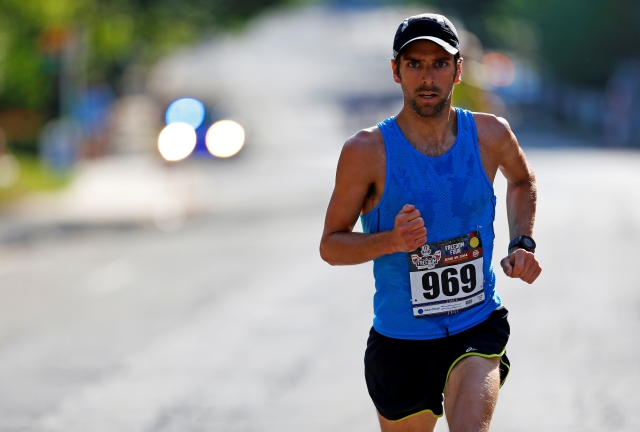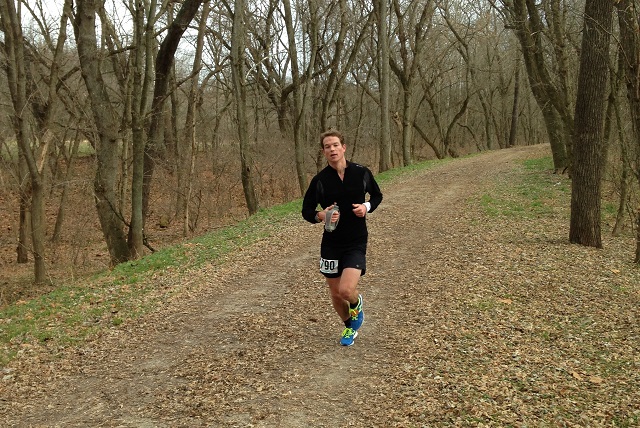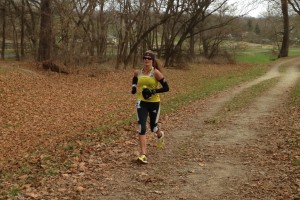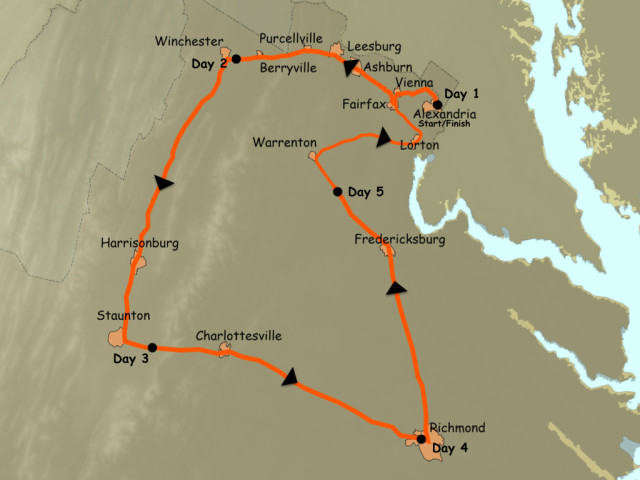
Running 500 miles in five days probably sounds like a crazy idea. That’s exactly what Amos Desjardins wants people to think.
“Sometimes it takes doing something crazy if you really want to get people’s attention,” he said.
He’s bound to get hungry with that kind of routine, but his discomfort is dwarfed by the cause he is promoting — the plight of one million Virginians, 12 percent of the population, without access to fresh and healthy food.
Each of the estimated million steps he will take will represent one of those hungry Virginians.
“I run a lot, obviously,” he said. “It’s a passion of mine. But food issues are also a really big passion of mine, and I really wanted to find a way to bring the two things together to bring awareness. People often don’t necessarily realize the magnitude.”
He grew up around farms, still grows his own fruits and vegetables and follows a vegan diet. Over the years, he has volunteered at Carpenter’s Shelter, which works to serve more than 1,000 homeless and formerly homeless children and adults in Virginia each year.
Desjardins started planning and training for the run after he decided last summer that he wanted to use running to help Virginia residents in particular who are suffering from hunger.
Since then, he has partnered with the Federation of Virginia Food Banks, a nonprofit state association that supports food banks in providing food, funding, education, advocacy and awareness services and programs throughout the commonwealth.
The federation currently has seven food bank locations in Virginia, each of which distributes millions of pounds of food to hundreds of agencies every year.
Leslie Van Horn, the federation’s executive director, has been working with Desjardins to help coordinate the route and ways they can work together to help spread awareness.
They thought September, Hunger Action Month, would be an appropriate time to hold the run.
“We’re so honored that Amos chose to work with us,” she said. “We’ve never had anybody do anything like this before in all of the federation’s time. It’s mind-boggling, really.”
Van Horn’s hope for the run is for it to eliminate stigmas that surround food issues in Virginia.
“Many people think that people who need assistance and go to food banks aren’t doing their part to help themselves, but that simply isn’t always the case,” Desjardins said.
Additionally, according to the recently-released 2014 Food Deserts in Virginia Task Force Report, Virginia’s low-access rate is 17.8 percent, which exceeds the national low-access rate of 7.3 percent. Food-insecurity rates are even lower than the statewide rate in more affluent areas in Northern Virginia such as Alexandria, Arlington, Fairfax and Manassas.
Desjardins will start Aug. 30 in Alexandria, at the corner of Union and King St. He’ll head to Winchester, Harrisonburg, Charlottesville and Richmond, before heading back to Alexandria by Sept. 3.
Each day will start at about 5 or 6 a.m., and hit a 10:00/mile pace. That will work out to 16 hours and 40 minutes of running per day, each of which will likely end in a hotel bath tub ice bath.
In the time he can spare, he will be stopping at the federation’s food banks in Along the way, Desjardins will be stopping to conduct meet and greets at four of the Federation’s food banks—in Augusta County, Richmond, Fredericksburg and Lorton. He hopes people will donate food at each of his appearances, or anytime they see the grey Jetta that will serve as his support vehicle.
“Amos is determined and can really accomplish anything he sets his mind to,” his wife Abigail said. “But it takes the help of friends and family to pull off something of this magnitude.”
Amos’ support team will include Abigail and his two of his close friends, Timothy Fitzgerald and Jeffrey Owens. Along the way, he will be followed by someone on a bicycle at all times and the support vehicle where roads allow; likely Owens.
“He texted me saying I was probably the only person crazy enough to come along for 500 miles on a bike, and I immediately agreed,” Owens said. “Amos has always been incredibly driven, and I’ve always wondered how he was going to use his boundless energy.”
The running joke among Amos’ friends, he said, is that no one’s ever seen him spent, even having run anywhere from 5ks to 70-plus-mile races.
When asked where he gets his energy to run, Amos responded without hesitation, “Life. Other people. I get a lot of joy and happiness from seeing others happy.”
He runs several ultras a year, and hopes to run next year’s Western States 100-Mile, one of the country’s most renowned and increasingly coveted ultras. If he is accepted, Western States will be his first 100-mile race.
Well, his sixth. After Sept. 3.
Follow Amos’ progress on his Facebook page.

Even after 50 miles of running, Zach Miller was still happy to be out on the JFK 50 Mile course.
For a guy who spends five months at a time at sea, the latest champion of the east coast’s big fall ultramarathon doesn’t take any time on land for granted. Miller, not to be confused with 2003 runner up Zachariah Miller, is based in Columbia, Pa., but that’s just a place his junk mail shows up while he’s on the boat. Results
“It’s good and it’s bad,” Miller said about his job operating printing equipment on cruise ships. “I’ve gotten to run on five continents and I’ll be able to do South America soon, but I really can’t get fast running 10 miles a day on a treadmill.”
That didn’t stop him from pulling away from Ultra Race of Champions winner Rob Krar somewhere between mile 33 and 38 and cruising to victory in 5:38:53, the third fastest time on the course and the youngest, at 25, under 5:40. Krar did not finish the race. Matthew Flaherty of Bloomington, Ind. was second in 5:44:37 and Arlington’s Michael Wardian, he of two marathons in a single day earlier in the week, finished third in 5:55:37.
“When they said I was going to come in under 5:40, I couldn’t believe it,” Miller said. “Only two guys had done that before, and one was Max King (2012 winner and course record holder at 5:34:59).”
Miller’s job affords him months-long vacations, and this one included a road trip to Nevada for the USATF 50k trail championships. A sixth-place finish helped convince JFK race director Mike Spinnler to let Miller into the race, though he didn’t decide on it until a few days before.
“I got the okay but I really had to think about if I really wanted to do it,” he said. “A 50 mile is a lot different from a 50k. I had never run more than 35 miles before.”
Whatever pre-race worries seemed quaint in retrospect of a race that came together “perfectly.” He took the 13 miles of alternating road and technical Appalachian Trail easy, cautiously navigating the rocks.
“I wanted to make sure my ankles came out of it,” he said. “I was falling back, but there was plenty of race left.”
When he and Jason Wolfe hit the C&O Canal Towpath for 26.3 miles, they took down the pace, but Miller considered that he might be running on borrowed time, though it was Wolfe who didn’t finish.
“I thought if we kept sub-6:00 pace up too long, I might blow up by mile 25,” he said. “I was working pretty hard, but once I caught up with Rob (Krar) and found out who he was, I was just happy to be up there with him. I was floored just to be in a position to be second to him.”
Miller didn’t know the kind of lead he had, or that Krar had dropped out, until he hit a tight turn with a little more than eight miles to go. On the rolling hills headed into Williamsport, Md. he tried to reconcile some of the splits he got from escort vehicles, 6:15 for one mile, with the fact that he had never pushed his body that far in a race.
“I was in the great unknown,” he said. “I was just seeing what I could do at that point, it felt like it was all adrenaline. I nailed the nutrition, because you have to take a lot of food to keep going. I think I had a banana at every aid station and my homemade gu.”
Oddly enough, the former Rochester Institute of Technology 10k runner might be well suited for ultra running because of his job situation.
“I don’t have the opportunity to train for a fast marathon, but I can get really strong,” he said. “When were at port, I go out and run because that’s my chance to get off the treadmill. If we’re in port for four hours, I’ll go run for four hours. Norway, South Africa, I just go out and run mountains.”
Warren County, Va. native and Flagstaff resident Emily Harrison might not have matched her time from her ultramarathon debut last year, when she dipped under the old course record coming in second to Ellie Greenwood, but she still managed to race with a commanding lead and capture the title that eluded her before.

“I felt a little off from the start,” she said. “Even leading up to the race, I knew I wouldn’t be as fast but (coach and habitual JFK runner) Ian Torrance said I could run in the 6:30s, so I just focused on getting the win.”
Her 6:35:05 was nothing to scoff at, because it was well ahead of Frederick’s Sage Norton‘s 7:14:03 and Boulder’s Kara Henry‘s 7:17:37.
“I just didn’t drop my pace on the canal this year,” she said. “I did get to see my parents and grandparents driving along the canal and thought to myself that I’d get to see them in a few miles.”
Those were just two of the 863 runners to finish the trek between Boonesboro and Williamsport, run the day after the 50th anniversary of President Kennedy’s assassination.
Erik Price hasn’t had his pick of great days in either of the ultras he’s run this year. The Oakton resident tried his hand at the Northern Virginia North Face Endurance Challenge 50 Mile in June, which saw hot muggy weather demolish the field. At JFK, temperatures in the upper 30s and lower 40s, which took a hit at mid-day were accompanied by a constant headwind. That’s coupled with the long, consistent stretch on the towpath, made Price somewhat wistful for the sweltering North Face conditions.
“Running that far on a flat course, you use the same muscles, make the same motion for so long,” he said. “People told me JFK was a tough race but I didn’t see it, looking at the elevation chart. Now I know.”
The conditions hit Reston’s Andrew Simpson hard, but he managed what he called a “great race” despite all of it.
” I think I was close to hypothermic,” he said after recovering from his 39th place finish in 7:29:32.
“Somehow I sprained my ankle along the way but didn’t notice until I stopped and tried to walk around the gym at the middle school,” he said. “Definitely an epic day for ultra-marathoning. I would think that JFK would have been very proud as the course tests you both mentally and physically.”
Simpson’s Team FeXY finished second in the men’s open category to Pain Train.
Lara Shegoski finished fourth on the women’s side, hundreds of miles away from where her Johns Hopkins University cross country teammates were celebrating their second consecutive Division III women’s cross country national championship. Shegoski spent a week out of training with the flu and getting back into the swing of training wasn’t easy.
“My coach said I could try to get back into shape and run one more race, but I figured it was time to move on,” she said. “I spent the summer not running because of ROTC training, so I wasn’t in shape for college racing.”
The ultra distance, though, worked out quite well. In a race that would make Aristotle proud, she just ran without a strategy or preconceived notion about the race, her mind a blank slate. That led to a surprise midway through the race.
“I thought I’d run nine hours,” she said. “I was running with two other women and one of them mentioned we were on sub-7:30 pace. Once I heard that, I started getting a little worried, so I stopped looking at splits.”
She finished in 7:20:45.
Eugene resident Emily Halnon signed up for the race while living in Washington, D.C., but she found her new training environment rocketed her into an optimistic mindset for the race.
“You have great trails, and great runners of all kinds,” she said. “It’s not just “Track Town.'”
She took the Appalachian Trail section carefully and managed to emerge unscathed.
“I fall in road races, so that was really big,” she said. “But it meant a lot of people passed by me.”
She emerged onto the towpath in 26th place and worked her way up to seventh by the time she turned onto the road, holding that place to the end.
Triathlete Alyssa Godesky of Baltimore had a breakthrough race, running 7:38:20 on her fifth JFK race for sixth place. Her previous best was around 8:05. She was the second woman to reach the towpath but found her pursuers running faster than she thought was sustainable for that long a race.
“I tried to hold on but I saw my Garmin putting us in the low-eights (pacewise) and I knew that wasn’t my plan, so I let them go,” she said. “I know what I’m getting myself into, I guess. I was excited to race an ultra now that I know how to race, triathlon definitely taught me that. I used to do ultras trying to go fast, but I have a different mentality now.”


